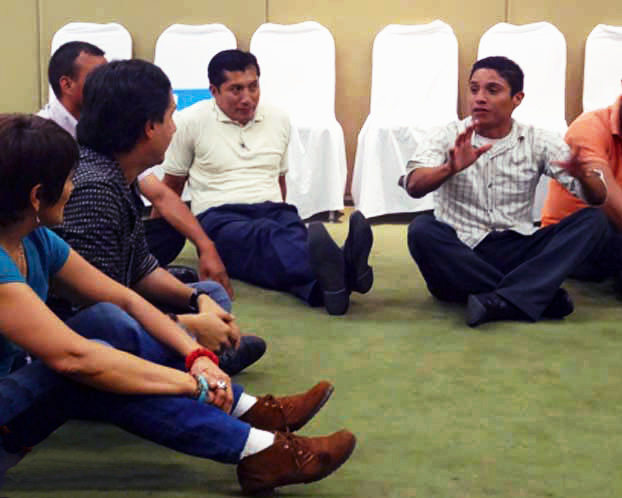

Towards a culture of peace and respect in Chiapas

"If we want to change the world, we must begin with ourselves, being better at what we do," says Jorge Trujillo, a newly-minted police officer in Ocosingo, in the southeastern Mexican state of Chiapas.
Keeping the peace can be a hard job in Chiapas, with tensions fueled by the continued displacement of thousands of people who were driven off their land during the 1994 violent clash between the Mexican state and Zapatista revolutionaries.
The MDG-Fund has launched a joint UN programme to reduce conflict and tension in the region by strengthening the criminal justice system, improving security and developing a culture of peace.
Building mutual respect
Trujillo, one of the programme’s beneficiaries, says one of his greatest challenges as a police officer is being respected in his community. "For people to change their opinion of us, we need to do our job well and learn how to treat people, because that’s who we deal with every day," he says.
Trujillo says that training courses offered to police departments through the UN Office on Drugs and Crime have helped him learn how to work with people and recognize what his community is going through. "I learned to understand the consequences of displacement in an area where it occurs very often, and how we should be the first to respond to these issues in an appropriate way.”
The training is part of the MDG-Fund’s work with the government of Mexico to reduce inequalities by reducing the conflict which fuels and perpetuates poverty. The joint programme operates in 24 communities in Chiapas, the poorest state in Mexico, where nearly half of the adults are illiterate and 85% of municipalities live on the poverty line.
The police training initiative has conducted four workshops in the municipalities of Ocosingo, Tila, and Tumbalá Salto de Agua this year. The workshops, which have trained 12 women and 27 men, cover topics as diverse as multiculturalism and worldview, identity and image of police in Chiapas, internal displacement, citizenship and social inclusion, and the challenges of being a police officer.
Before joining the police force, Trujillo was in the military, where he acquired the discipline and vocation to work for his communitiy. "That's why I'm here, I like to serve and partner with my fellow citizens."
Learning to value each other
He says he benefitted greatly from the joint programme training and was surprised by how dynamic it was. "I learned something different: you’re teaching me but I’m also teaching you; you learn from me but I learn a lot from you. That was the best thing about it, learning to value each other. It's nice to be heard and to have your views taken into account."
Trujiillo’s dedication to his work and his friendly nature earned him a promotion to group leader. But he acknowledges that his job involves risks. "The hardest thing is to understand that even if you have all the willingness to want to help people, there are situations that are not in your hands," he says.
"If I take off my uniform, I’m still a policeman, even when I play football, because everyone knows me. If the police arrest someone who then is released, sometimes when they meet me they want to get even. Many don’t realize that I’m just doing my job. I try to explain that if they haven’t committed a crime, I have no reason to detain them."
Trujillo says the joint programme training has also taught him the importance of gender equality. Having a different point of view from women has helped him to value and appreciate the work of his female peers. He also notes that his character has improved after he implemented some of the techniques he learned in the training: "Dialogue and communication are important. if I'm happy with myself, I’ll do a good job in my work."
Reducing poverty by reducing conflict
“Conflict prevention, development of agreements and peace building for internally displaced persons (IDPs) in Chiapas State” is implemented by four UN agencies (UNDP, UNESCO, UNICEF and UNODC) in collaboration with state and local authorities and civil society groups.
It works with 24 communities of people displaced by the clash between the Mexican State and the Zapatistas to reduce conflicts and tensions and to promote lasting solutions focused mainly on reducing poverty and promoting the rights of vulnerable groups.
The programme is part of the MDG-Fund’s work to diminish inequalities and to assist governments around the world in reaching the Millennium Development Goals of reducing poverty and improving livelihoods.